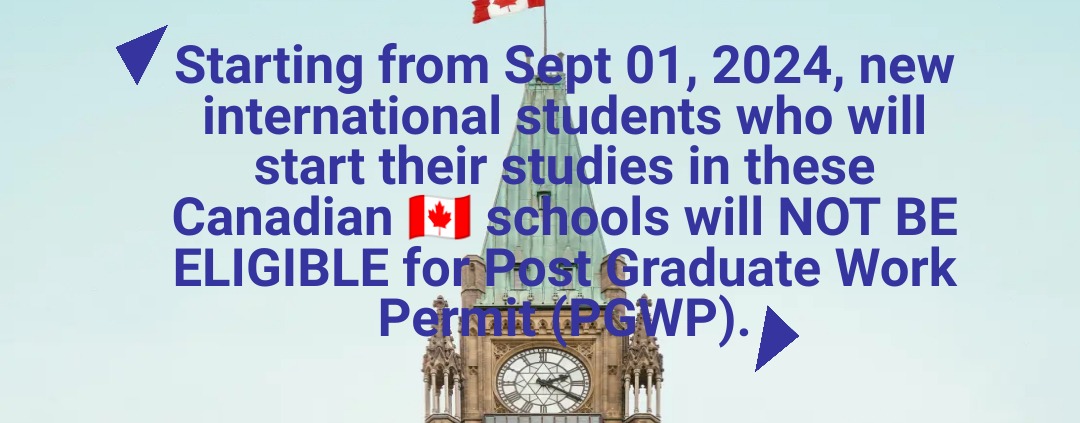If you’re an international student planning to study in Canada starting in September 2024 or later, you need to be aware of some major recent changes to the rules around post-graduation work permits.
In an effort to crack down on poor-quality education providers, Immigration, Refugees and Citizenship Canada (IRCC) has released a revised list of designated learning institutions whose students will no longer be eligible to apply for a post-graduation work permit (PGWP) upon completing their studies.
A PGWP is a highly valuable open work permit that previously allowed international graduates from any designated learning institution to remain in Canada and gain professional work experience for up to 3 years after finishing their program.
However, after extensive review, IRCC has determined that the schools on this new ineligible list do not meet the standards required for their graduates to qualify for this immigration benefit starting September 1, 2024.
The 15 Schools Now Ineligible for PGWP
Here are the schools in Canada that have been deemed ineligible for the post-graduation work permit starting September 1, 2024, along with details about their affected campuses:
1) Algonquin College – CDI College campuses in Mississauga and North York have been removed from the designated list. However, Algonquin’s main Ottawa campuses remain eligible.
2) Cambrian College – The Hanson campus locations in Brampton and North York are now ineligible. Cambrian’s main campus in Sudbury is still approved.
3) Canadore College – The Stanford International College campuses in Mississauga, Scarborough, and Brampton have lost their designation for PGWP eligibility. The main campuses in North Bay are still okay.
4) Fanshawe College – Only the Ilac campus in Toronto is affected. Fanshawe’s main London campus is designated.
5) Fleming College – The Toronto campus operated in partnership with Trebas Institute Ontario no longer qualifies students for a PGWP. Main Peterborough campuses are still approved.
6) Georgian College – The ineligible campus is the Ilac location in Toronto. Georgian’s main campuses across central Ontario allow PGWP.
7) Loyalist College – The Toronto campus is now revoked. The Main Belleville campus remains a designated learning institution for PGWP purposes.
8) Lambton College – The Mississauga and Toronto campuses have lost their designated status. Lambton’s main Sarnia campus is still eligible.
9) Mohawk College – Only the triOS campus in Mississauga is affected. Main Hamilton campuses are approved.
10) Northern College at Pures – The Toronto campus location is now ineligible. Northern’s main campuses in northern Ontario are designated.
11) Niagara College – Just the Toronto School of Management (TSoM) campus is removed. Niagara’s campuses in the Niagara region qualify for PGWP.
12) St. Clair College at Acumen – The Toronto, Mississauga, and Brampton locations under Acumen no longer allow PGWP. Main Windsor campuses are designated.
13) Sheridan College at CCTT – Only the Fort Erie campus is impacted. Sheridan’s main Oakville/Mississauga campuses allow PGWP.
14) Sault College – Just the triOS campuses in Toronto and Brampton are affected. The main campus in Sault Ste. Marie is designated.
15) St. Lawrence College – The Alpha International Academy campus in Toronto lost its status. St. Lawrence’s campuses in eastern Ontario are eligible.
As you can see, in most cases these revocations target campuses operated by partner institutions or in the Greater Toronto Area, while leaving the main college campuses across Ontario still fully accredited and able to issue studies qualifying for a PGWP.
Why the Change?
According to IRCC, this new policy aims to ensure international students are receiving a high quality education from their designated learning institution. Only graduates of appropriately accredited and regulated schools should benefit from an open work permit upon graduation.
Immigration authorities identified concerns with the governance, operations, and educational programs offered at these affected campuses and partner locations. As a result, IRCC has revoked their designated learning status for the post-graduation work permit policy.
Current students at any of these now-ineligible campuses who began their program before September 1, 2024, will apparently still be eligible to apply for a PGWP when they graduate. However, new enrollments after that date will be excluded from the program.
IRCC states that even applying for a study permit from one of these affected schools or campuses after September 1, 2024, maybe more scrutinized and face higher rejection rates.
What This Means for Your Study Plans
Suppose you already have applications submitted or study plans in motion for one of the schools on this ineligible list with a projected start date from September 1, 2024, onward. In that case, you have a major decision to make.
Do you proceed with that school knowing you will be giving up the ability to work in Canada for up to 3 years after graduation via a PGWP? Or do you need to re-evaluate your options and apply elsewhere to keep your post-graduation work permit dreams alive?
For many international students, the inability to gain Canadian work experience after graduation may be a dealbreaker when it comes to their long-term goals of potentially immigrating through programs like the Federal Skilled Worker program or Provincial Nominee pathways. These routes require significant skilled work experience to qualify.
However, if your sole objective is just to earn your Canadian credential before returning to your home country, then attending one of these impacted schools may still be an option worth considering, depending on their costs, reputation, and quality. But you’ll have to weigh the pros and cons carefully.
With application deadlines for Fall 2024 intake quickly approaching, the time is now to make any necessary adjustments to your study plans and development of a long-term Canadian immigration strategy if a post-graduation work permit is part of your plan.
Moving forward, be sure to closely scrutinize and validate any potential school’s designation status and post-graduation work permit eligibility policy for international students. What may have been true in previous years could now be impacted by this significant policy change.
IRCC has made its priorities clear – only graduates of quality, approved education providers will benefit from an open work permit in Canada. For international students, choosing the right accredited school and campus location from the very start is critical if you have post-graduate immigration plans.
Quality over quantity appears to be the new directive when it comes to international students being able to work in Canada after graduation. With these revocations, IRCC has drawn a line in the sand over what institutions meet their standards.




Leave a Reply
Want to join the discussion?Feel free to contribute!